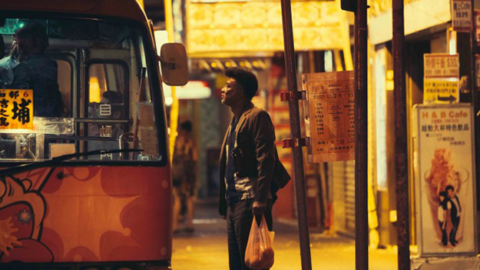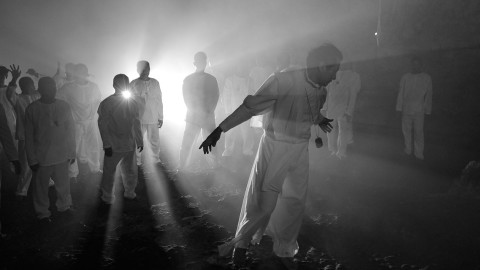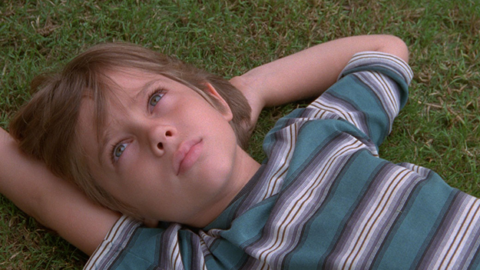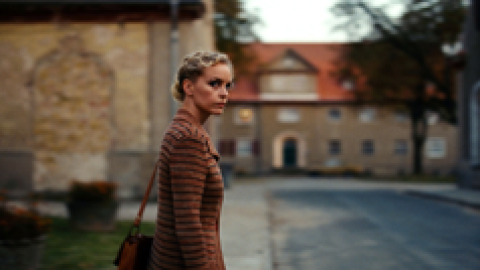Festivals: Berlin
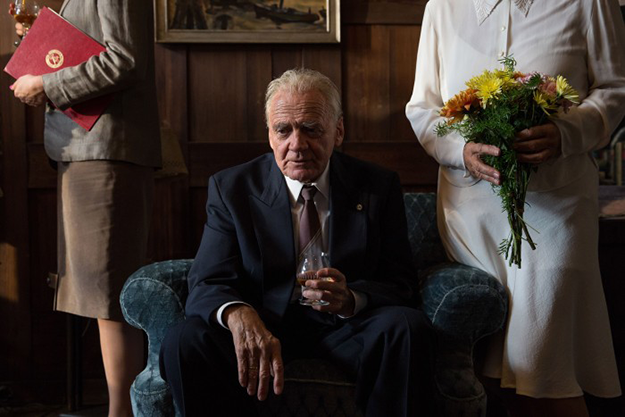
Times of Fading Light
The 2017 Berlinale was the festival of unhappy families. Wherever you looked, there were huis clos about clans at war (with the world or with each other), clans in peril, clans tormented by the tide of history—and sometimes all this was taking place behind closed doors, with celebratory glasses raised to some kind of tenuous unity. A fine example was one of those films in which a family gathering stands for the state of a particular nation—the German Democratic Republic in its very final days, as depicted in Matti Geschonneck’s highly traditional, somewhat stagey, but altogether compelling In Times of Fading Light. It’s set in East Berlin in 1989, where a family—plus a delegation of assorted officials—gather to honor the 90th birthday of a diehard Communist patriarch and party hero, played by Bruno Ganz. Various stresses appear in the fabric of this carefully planned event—a dinner table collapses, an elderly Russian in-law decides she’ll walk back to the old country, her daughter speaks a few vodka-fuelled home truths—and no one dares tell the old man the great taboo news, that his grandson has just left for the West. Family history—exile in Mexico, time served laboring in a Russian forest—merges with national history, and no one escapes looking the future in the face.
No one knows whether they’ll see a future in Insyriated, since the present is breathing down their necks so instantly. Written and directed by Philippe van Leeuw, whose credits as cinematographer include Bruno Dumont’s La Vie de Jésus, this is a claustrophobic drama about a family that, by necessity, expands to absorb outsiders as the outside world gets ever more dangerous. The setting is a Damascus apartment today; its inhabitants are the last family to leave the building, despite the knowledge that their lives are endangered by bombardment and by visits from “security” forces. Hiam Abbass plays the mother shepherding her family, which spans three generations, from room to room, while Diamand Abou Abboud is a neighbor, a young mother whose own home upstairs has been destroyed. She and her husband are planning to leave for safety in Beirut, but what she doesn’t know is that he has been shot by snipers and is lying, possibly dead, in the yard outside (seen at start and finish, the only points at which van Leeuw stretches the film’s rigorously enclosed parameters). It’s an immensely suspenseful work, not that it reduces the Syrian conflict to any mere thriller fodder. But sitting in a cinema for 85 minutes rarely feels like being enclosed for an entire day, the way that it does here. And for once, that is actually to be taken as a compliment.
A possibly dead body, a Wall jumper… Are “family enclosure” stories by nature about secrets that only a few know, that must otherwise be kept at all costs? One wouldn’t want to stretch the point, but it’s also a key element in My Happy Family, the new film by the Georgian-German duo now known simply as “Nana and Simon” (presumably because Nana’s surname, Ekvtimishvili, doesn’t roll easily off international festivaliers’ tongues; his surname is Gross). Their first feature, In Bloom, was a coming-of-age drama about two teenage girls in the conflict-torn Georgia of the early ’90s. My Happy Family is arguably less ambitious in scope and theme, but it’s a mature, finely modulated drama that invites the viewer into an intimate, vibrant family nest—and then shows you why the mother of that family would choose not to stay there.
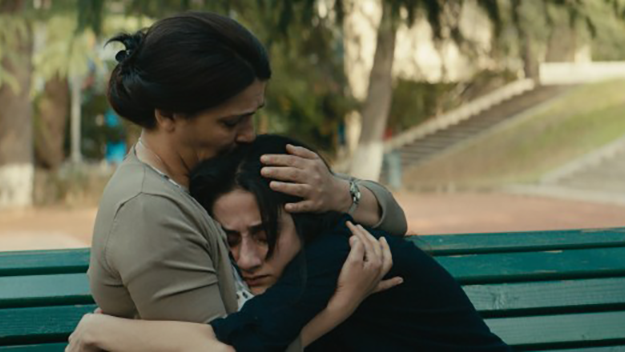
My Happy Family
Ia Shugliashvili plays Manana, a middle-aged married woman whose role as mother consists partly of keeping a low profile, keeping everyone on an even keel, and listening to the complaints of her husband, her domineering mother and her children—plus her daughter’s husband, who is also a permanent resident. Outside the home, she’s a teacher, helping her students sort out their own domestic problems, she does with a girl whose reason for staying off school is that she’s been coping with her own divorce—at 17! (Extremely young marriage seems to be a key issue in Georgian family dynamics, to judge from this and In Bloom.)
Everyone’s charming, everyone’s fairly pleasant to be around—after all, everyone is family. But Manana has decided that she needs a room of her own, somewhere to sit and drink tea, listen to music, and enjoy the rustle of the leaves outside her window, even if it is in –people constantly tell her—a less desirable quarter of Tblisi. But her family won’t let her go that easily. A nicely sour comic moment comes when her husband pays a visit, and is heavily leaned on by some male neighbors, who tell him that they don’t want anyone making trouble for such a nice lady; it turns out that Manana’s brother has arranged for them to keep a protective eye on her. Manana just seems permanently to get the wrong sort of protection, as she learns when she goes to join some old school friends at a party and hears everyone casually discussing a bit of tittle-tattle that, presumably, she’s been protected from within her family for a very long time. This scene is a beautiful coup of dramatic economy: what’s at stake is nothing less than a bomb in her life, but here it’s dropped with the delicacy of a feather.
There’s a walking, talking secret at the heart of Sebastián Lelio’s film A Fantastic Woman (Una mujer fantástica)—and that secret is the eponymous woman herself. She is Marina, a waitress and nightclub singer with operatic aspirations who is the lover of a rather older man, Orlando (Francisco Reyes, a dead ringer for Paul Verhoeven), who has left his family to live with her. One night, Orlando has a heart attack and dies; the fact that he falls down a staircase just before doing so leaves Marina open to routine suspicion. But the suspicion turns to a systematic process of humiliation and victimization, for Marina—and some may guess this from the very start—was born male, and that is something that Orlando’s moneyed bourgeois family cannot countenance. Marina is told she will have to vacate the flat she shared with Orlando, to give up the dog he gave her, to stay away from his funeral—which, of course, she doesn’t, causing this respectable family to close ranks and turn very vicious indeed.
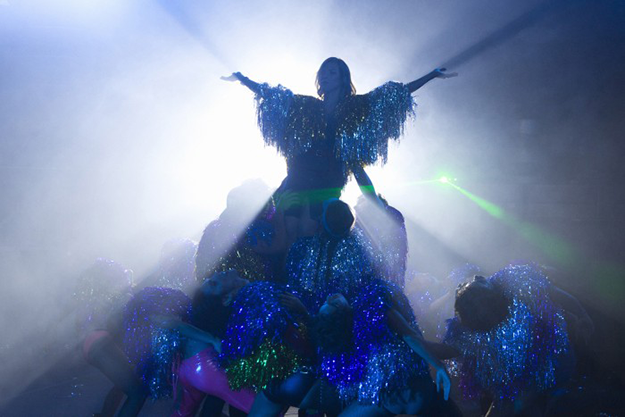
A Fantastic Woman
There’s a certain schematic quality to Lelio’s film—once we know the truth about Marina, we can guess how everyone, from the family to a police officer played by Pablo Larraín regular Antonia Zegers, will respond to her. And we know too that Marina will round off her story with an act of somewhat crowd-pleasing defiance—not unlike that of the middle-aged heroine of Lelio’s last film, divorcee drama Gloria. The film is dead simple in its visual execution, except for some symbolic flourishes that will either jar with you or make you feel there’s a mysterious resonance you can’t quite pinpoint—like a lingering shot of the dark interior of a sauna locker, this film’s equivalent of that black sun of an air extractor in Apichatpong’s Syndromes and a Century. But A Fantastic Woman was the most accomplished mainstream film in competition at this year’s Berlinale, and as Marina, transgender performer Daniela Vega gave one of the most fascinating performances to be seen here, shifting moods—and almost shifting the lines of her face—from shot to shot with mercurial fluidity. Fantástica, for sure.
Jonathan Romney is a contributing editor to Film Comment and writes its Film of the Week column. He is a member of the London Film Critics Circle.



